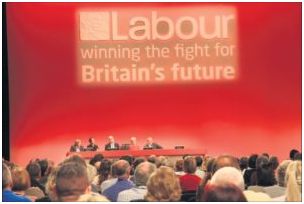This is a statement by the Political Committee of Socialist Alternative (England, Wales & Scotland).
Labour’s 2019 election result is a setback but not the apocalyptical catastrophe the media paint it as. The Labour vote exceeded that obtained by Blair in 2005 and Brown in 2010. Many of the newly elected Tory MPs have very slender majorities which could easily be overturned, if a combative, mobilising, socialist strategy is adopted.
Labour’s campaign in 2017 achieved a 40% vote share by offering a radical programme to end austerity. Huge rallies and a popular manifesto inspired a new generation of voters and gave hope to older ones. Unfortunately, the momentum reached in 2017 was squandered in the subsequent two years. Corbyn came under pressure from the right in the party to allow a further referendum on EU membership, and the Labour leadership, distracted by parliamentary manoeuvres, appeared hesitant about a general election for which the party was consequently ill-prepared.
In the wake of the defeat Corbyn shouldn’t have announced he was standing down. He should have stayed to defend the left programme he had fought for, learning the lessons necessary to complete the socialist transformation of the Labour Party and to drive the further democratisation of the party.
However, a leadership contest is under way and the most important task, for party members, trade unionists and socialists, is to ensure that there is no backtracking on the pro-working-class pledges contained in the manifestos of 2017 and 2019, or on the left policies agreed by Labour’s conferences since Corbyn became leader. On the contrary, what is needed is a strategy to go further, deepening the process of converting the party into a mass socialist force.
It is undoubtedly the case that Labour needs to reconnect with the working class and it can only do this by becoming a party of struggle, based on the working class and open to socialists. To do this the party must not only take sides with striking workers, service users opposing cuts and school students campaigning against climate change, but be prepared to mobilise and unite them as well as to inspire the broader movement to act in solidarity with such struggles. Labour must offer clear policies which show that they are just as determined to defend the interests of the working class as the Tories are to defend the interests of the capitalists. This means fighting the Tories’ austerity policies and insisting that Labour councils who over the last ten years have implemented Tory cuts now adopt policies to defend and extend services, using reserves and borrowing powers to resist making cuts and launch a mass campaign of opposition aimed at winning back the resources which councils have been deprived of.
We think there needs to be a discussion about why Labour’s support has decreased so much in Scotland. Socialist Alternative believes that the failure to support the right of self-determination was a major barrier to winning support, and allowed the SNP to appear to be the only ones championing national and democratic rights. An anti-austerity programme, linked to fighting for self determination, including supporting the fight for an independent socialist Scotland as part of a socialist federation, could start to win back support.
There must be maximum opportunities for the rank and file of the Labour and trade union movement across the country to hear candidates and question them, and to evaluate their political positions and programmes. In this context, it is utterly wrong that the leadership of public sector union Unison has stated its position before the first stage of the ballot had closed and based on the view of a handful of senior union officials, consistent with their Blairite approach.
There should be special, accessible meetings held to hear debates before nominations are made, if necessary with agreed representatives of the candidates.
As the parliamentary stage of the contest closes it is clear that the following candidates are validly nominated by the required 22 MPs or MEPs for the position of leader: Rebecca Long-Bailey, Lisa Nandy, Jess Phillips, Keir Starmer and Emily Thornberry.
And for Deputy Leader: Rosena Allin-Khan, Richard Burgon, Dawn Butler, Ian Murray, Angela Rayner.
Now all candidates must secure backing from either 5% of local parties – a total of 33 – or three affiliated organisations including two trade unions adding up to 5% of the affiliated membership. This means in many local areas battles may now commence over candidate nominations through CLPs, as well as potentially within the unions. It is vital that Corbyn supporters are organised and mobilised, fighting to ensure the candidates clearly pledging to defend socialist policies are nominated.
Long Bailey and Burgon
Socialist Alternative is critically supporting Rebecca Long-Bailey for Leader and Richard Burgon for Deputy Leader. Why?
Rebecca Long-Bailey is clearly the closest to a Corbyn ‘continuity candidate’, and the victory of any other candidate would be a significant defeat for our movement and an important strategic victory for the rich and powerful who desire a clear step away from positions held while Corbyn was leader of the party. From their point of view, this would allow a return to “normality”, in which British capitalism has two major parties it can rely on to faithfully represent its interests and which can alternate in government.
Long-Bailey has been firmly associated with Jeremy Corbyn, has publicly described herself as a socialist, calling for “democratic socialism in our lifetime”, and is the candidate most likely to pursue a left programme. She has identified herself with workers’ struggles and with community campaigns in her Salford constituency, even at the cost of some embarrassment to the local Labour council.
She has also spoken about the need to deepen democracy in the party. Labour Party policies must be democratically determined, but democratisation must also mean the mandatory reselection of MPs and full democratisation of policy-making. This should include restoring a full democratic role for trade unions within the party, and immediately reversing all aspects of the ‘reforms’ undermining workers’ participation in the party’s decision making carried out in the Blair years. Long-Bailey should explicitly back the increasingly popular demand for mandatory reselection.
In relation to anti-Semitism, which has no place in the labour movement, Long-Bailey needs to recognise that the charge of anti-Semitism against many (not all) has often been based on legitimately expressed concerns about the Israeli state’s treatment of the Palestinian people, and directed against those who also supported Corbyn’s attempts to shift the Labour Party in a socialist direction.
However, in our view it was a major mistake by Rebecca Long Bailey to endorse the Board of Deputies of British Jews’ “ten Labour leadership pledges”, along with all the other candidates for leader. This isn’t because we don’t take concerns about anti-Semitism seriously. Any allegations of discrimination should be acted upon, and all forms of racism represent poison for the workers’ movement and must be fought. However, the approach outlined in these pledges, and that has been advocated more generally by the Board of Deputies since Corbyn became leader of the Labour Party, has in our view been aimed at redefining anti-Semitism in a way that risks equating criticism of the role of the Israeli state in the oppression of the Palestinians with racism against Jewish people.
Anti-Semitism
This approach is confirmed in these pledges, one of which demands full adoption of the IHRA ‘definition’ of anti-Semitism, without the caveat previously agreed under Corbyn which seeks to protect the right to free speech on the conflict in Israel-Palestine.
Perhaps even more worryingly, the Board of Deputies also demands the setting up of an ‘independent’ body to oversee disciplinary cases within the party relating to this issue. While this demand may sound innocuous, the reality is that there is no such thing as political ‘independence’ in a society such as ours – one in which the working-class majority face hardship and exploitation while a tiny minority of ultra-rich individuals (of all religions and nationalities) own and control vast swathes of our economy, and consequently the lives of millions. The right of working-class organisations to set and enforce their own rules, as well as to carry out their own disciplinary procedures, is actually of fundamental importance to building organisations which can independently represent workers’ interests against those of the capitalists.
The pledges also seek special rights for groups they deem to be the ‘mainstream’ representatives of British Jews, such as the Board of Deputies itself. But this is just one organisation of the Jewish community among many that may have a different approach.
Jewish people are not one homogeneous group. Among Jews there are people of all classes, there are differences in religious practice or lack thereof, and there is a diverse range of political views on all issues, including those related to the question of Israel-Palestine. No organisation can therefore claim to automatically represent the views of all Jews in Britain.
The main motivation behind the Board of Deputies’ pledges, as with the intervention by the Chief Rabbi Ephraim Mirvis during the election campaign, is a political opposition to the policies of Corbyn and the left. Left-wing Jewish groups, such as the Jewish Socialists Group and Jewish Voice for Labour supported Corbyn in the general election.
Agreeing to these demands is a mistake by Rebecca Long-Bailey which reflects pressure of both the capitalist press and the Blairite wing of the Labour Party, who have used whatever means they can, no matter how hypocritical, to attack Corbyn since he was elected leader. Fundamentally, this is because they are opposed to taking the Labour Party in an anti-austerity or socialist direction.
Rebecca Long-Bailey should learn that no matter how many concessions Corbyn made to the right, they were never satisfied and it only served to increase their confidence to make further attacks. Long-Bailey’s comments that she would “press the button” when it comes to using a nuclear deterrent is another mistake in this thread.
The pressure from the capitalists to move to the right will only grow. This will be all the more so if the party follows her unwise recommendation and elects Angela Rayner as Deputy.
Notwithstanding her engaging ‘back story’ and high public profile, Rayner was an integral part of the right-wing machine in Unison when she was a branch secretary, failed to endorse Corbyn for leader in 2015 and shamefully abstained on the Tories’ draconian welfare bill during the Cameron years. We recommend support for Richard Burgon who has been a steadfast supporter of Corbyn, and a more effective advocate for left policies in the media.
This is the team we believe is most likely to defend and further the position of the left in the party. We understand activists’ concerns at the lack of diversity in a team of two white solicitors. But no other candidates, of whatever ethnic background, have been so closely identified with the Corbyn ‘project’ and no-one else is likely to attempt to take it forward.
If Long-Bailey and Burgon are to be successful in being elected, as well as being able to carry out the transformation of the Labour Party, it is not just a question of what policies they stand by or for. They also need to launch a mass campaign to mobilise the membership and supporters outside of the party in defence of such a programme. They should organise mass rallies and protests, linking with the climate strikes and the UCU university strikes in February, and beginning the process now of transforming the party into one of struggle. It was this type of approach which Corbyn had in 2016 after the ‘chicken-coup’ which embarrassed his opponent Owen Smith and generated mass support. Unfortunately, Corbyn did not continue with this approach outside of election time, which will need to be a mistake that is not repeated if Long-Bailey wins.
Socialist Alternative did not simply cheerlead for Corbyn’s programme during the election period. We believe he should have gone further, for example on nationalisation, and in recognising, and preparing to counter, the resistance from the boss class to a radical Labour government. But that programme marked a huge step forward for the movement and drew literally hundreds of thousands into the Labour Party. It is a tribute to those ideas, and to that mass membership, that none of the candidates has been willing to mount a frontal assault on Corbyn’s legacy. We believe that the left can win this election, if it unites behind a single candidate for each post on clear policies with a massive campaign to mobilise the membership in the ballot, and take further the battle for socialism inside and outside the Labour Party.



